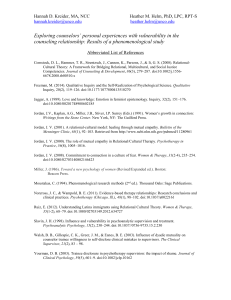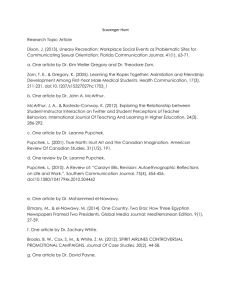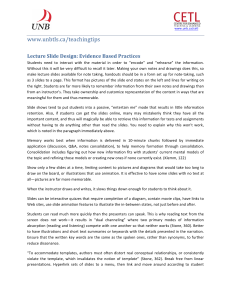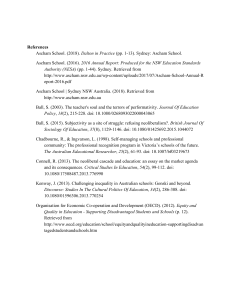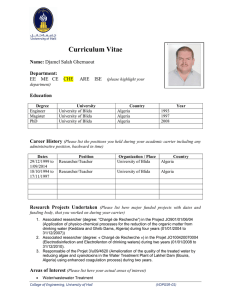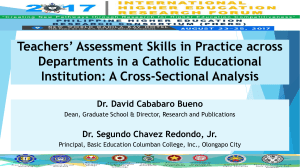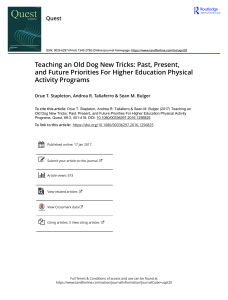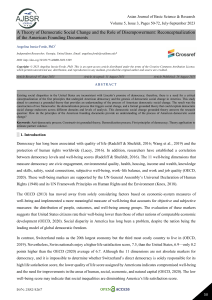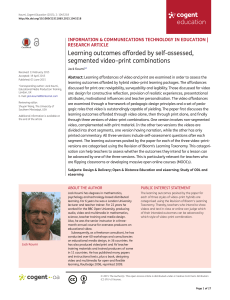(EDT 370) Technology in Education Syllabus of Record
advertisement
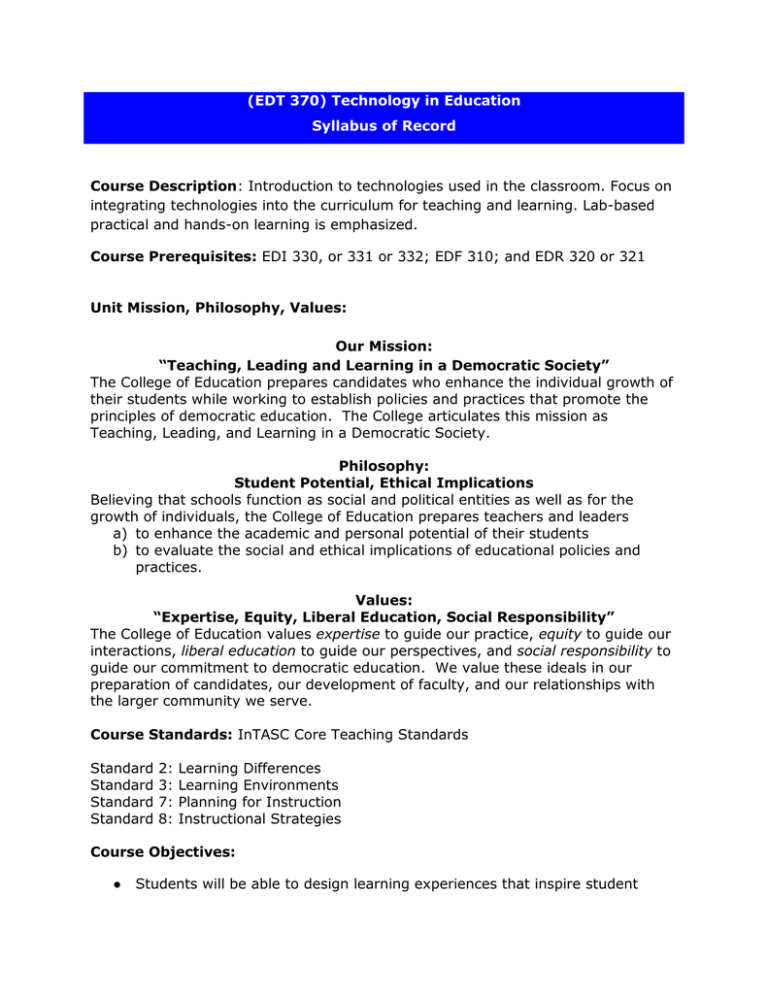
(EDT 370) Technology in Education Syllabus of Record Course Description: Introduction to technologies used in the classroom. Focus on integrating technologies into the curriculum for teaching and learning. Lab-based practical and hands-on learning is emphasized. Course Prerequisites: EDI 330, or 331 or 332; EDF 310; and EDR 320 or 321 Unit Mission, Philosophy, Values: Our Mission: “Teaching, Leading and Learning in a Democratic Society” The College of Education prepares candidates who enhance the individual growth of their students while working to establish policies and practices that promote the principles of democratic education. The College articulates this mission as Teaching, Leading, and Learning in a Democratic Society. Philosophy: Student Potential, Ethical Implications Believing that schools function as social and political entities as well as for the growth of individuals, the College of Education prepares teachers and leaders a) to enhance the academic and personal potential of their students b) to evaluate the social and ethical implications of educational policies and practices. Values: “Expertise, Equity, Liberal Education, Social Responsibility” The College of Education values expertise to guide our practice, equity to guide our interactions, liberal education to guide our perspectives, and social responsibility to guide our commitment to democratic education. We value these ideals in our preparation of candidates, our development of faculty, and our relationships with the larger community we serve. Course Standards: InTASC Core Teaching Standards Standard Standard Standard Standard 2: 3: 7: 8: Learning Differences Learning Environments Planning for Instruction Instructional Strategies Course Objectives: ● Students will be able to design learning experiences that inspire student ● ● ● ● ● ● ● ● ● ● ● ● learning with digital age tools and resources. Students will be able to develop innovative learning materials and processes that incorporate the effective use of technology to advance student learning. Students will be able to model the collaborative construction of knowledge by interacting, collaborating, and publishing with students, colleagues, and experts employing a variety of digital environments and media. Students will be able to develop and model cultural understanding and global awareness by engaging with colleagues and students of other cultures using digital age communication tools. Students will be able to develop effective strategies to guide professional research to support student learning. Students will be able to evaluate and select information sources and digital tools based on the appropriateness of the specific task. Students will be able to collect and analyze formative and summative assessment data to inform instruction using digital-age tools. Students will be able to customize student learning using digital tools and resources to address various learning styles, working strategies, and student abilities. Students will be able to advocate, model, and prepare safe, legal, and responsible use of information technologies. Students will be able to demonstrate fluency in the use of technologies for the classroom. Students will be able to select and use educational applications appropriately and productively. Students will be able to participate professional learning experiences to explore creative applications of technologies to improve student learning. Students will be able to provide leadership for others in the use of digital-age tools and resources to advance effective technology integration in the curriculum. Course Topics: 1. Technology Operations and Concepts (2 weeks) 2. Educational Technology for Creativity and Innovation in Learning (3 weeks) 2.1. Model Digital-Age Work and Learning (1 week) 2.2. Research and Information Literacy Fluency (2 weeks) 2.3. Digital Citizenship and Responsibility (2 weeks) 2.4. Technology for Communication and Collaboration (2 weeks) 2.5. Technology in Assessment (1 week) 3. Professional Practice and Leadership (1 week) Methods of Evaluation: Technology Lesson Plan Possible Texts: ● Educational technology research and development (ETRD) ● ● ● ● Journal of Computing in Teacher Education (JCTE) Journal of research on computing in education (JRCE) Journal of Research on Technology in Education (JRTE) Learning and Leading with Technology (L&L) Sample Articles: ● ● ● ● ● ● Chaiprasurt, C., & Esichaikul, V. (2013). Enhancing Motivation in Online Courses with Mobile Communication Tool Support: A Comparative Study. International Review Of Research In Open & Distance Learning, 14(3), 377400. Greer, D., Rowland, A. L., & Smith, S. J. (2014). Critical Considerations for Teaching Students With Disabilities in Online Environments. Teaching Exceptional Children, 46(5), 79-91. doi:10.1177/0040059914528105 Hutchison, A. C. & Woodward, L. (2014). An Examination of How a Teacher's Use of Digital Tools Empowers and Constrains Language Arts Instruction. Computers in the Schools: Interdisciplinary Journal of Practice, Theory, and Applied Research, 31(4), 316-338, DOI: 10.1080/07380569.2014.967629 Kavanoz, S., Yüksel, H. G., & Özcan, E. (2015). Pre-service teachers' selfefficacy perceptions on Web Pedagogical Content Knowledge. Computers & Education, 8594-101. doi:10.1016/j.compedu.2015.02.005 Li, J., Snow, C., & White, C. (2015). Urban adolescent students and technology: access, use and interest in learning language and literacy. Innovation In Language Learning & Teaching, 9(2), 143-162. doi:10.1080/17501229.2014.882929 Lindqvist, M. J. P. H. (2015). Gaining and Sustaining TEL in a 1:1 Laptop Initiative: Possibilities and Challenges for Teachers and Students. Computers in the Schools: Interdisciplinary Journal of Practice, Theory, and Applied Research, 32(1), 35-62, DOI: 10.1080/07380569.2015.1004274 Sample Online Resources: ● ● ● ● ● ● ● http://www.ed.gov/oii-news/use-technology-teaching-and-learning http://www.atomiclearning.com http://www.iste.org/standards https://en.wikipedia.org/wiki/Educational_technology http://wgvu.pbslearningmedia.org/ http://site.aace.org/ http://webquest.org/

